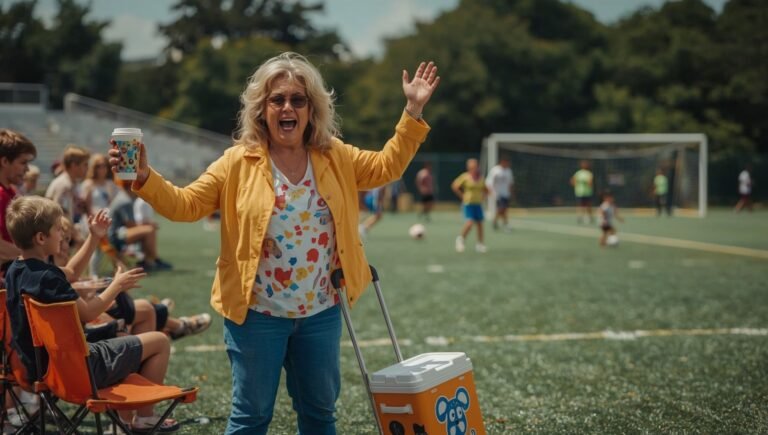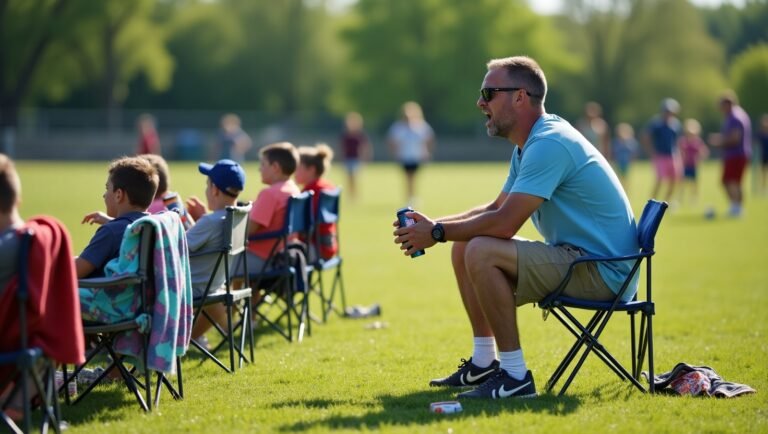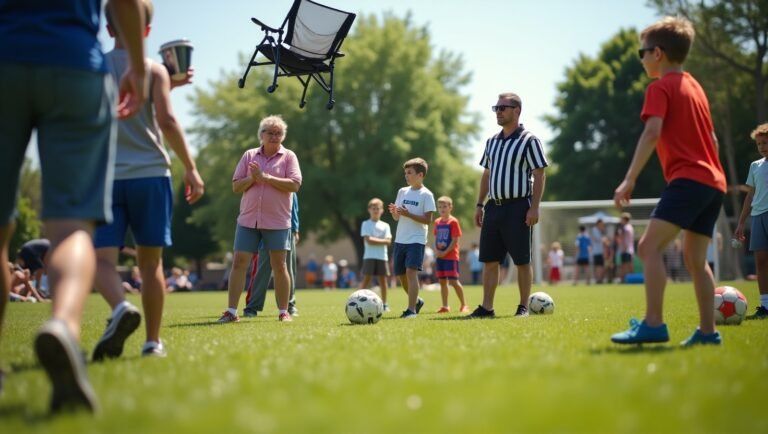Welcome to the Sideline Circus
Every youth sports parent promises themselves it won’t happen: I will not have a sideline parent meltdown this season. You bring your folding chair, pack your cooler, and convince yourself you’ll just be supportive. You’ll cheer politely, clap when appropriate, and let the coach do the coaching. Easy, right?
Until the game starts.
Suddenly, your heart races, your jaw tightens, and before you know it, you’re gripping your coffee like it’s a stress ball, muttering about calls, and transforming into the very parent you swore you’d never be. The sideline parent meltdown has arrived, and it’s as unstoppable as a soccer mom power-walking with Starbucks in one hand and a folding chair in the other.
This is more common than parents want to admit. Youth sports pressure is real. According to the Aspen Institute, nearly 70% of kids quit sports by age 13, often citing overbearing sports parents as one of the top reasons. Meanwhile, the National Association of Sports Officials (NASO) reports referee shortages nationwide, thanks in large part to parents yelling at refs every weekend.
So let’s break it down. These are the five stages of a sideline parent meltdown: denial, yelling, pacing, blaming the ref, and the dreaded silent car ride home after the game. And more importantly, let’s talk about how to survive them without becoming that parent.
Stage One: Denial — “I am totally calm”

The first stage of a sideline parent meltdown is denial. This is where youth sports parents convince themselves they’re not like the others. You sit down, unfold your chair, sip your coffee, and tell yourself you’re just here for fun.
But denial doesn’t last long. Your clenched jaw, bouncing knee, and muttered sideline behavior tell a different story. From the outside, you look calm. Inside, you’re a volcano waiting for the first bad call to blow.
Denial is sneaky because you really believe you’re under control. You swear you’re not that parent pacing the sideline or yelling at refs. But then you catch yourself muttering “Come on!” or groaning loudly when your kid misses. Congratulations — you’re already halfway into your sideline parent meltdown and you don’t even know it yet.
Parent Survival Kit for Denial:
- Stress Relief Gummies — sideline Skittles for your nervous system.
- Adult Coloring Book — better to shade mandalas than scream about offsides.
- Noise-Cancelling Earbuds — block out other parents’ bad advice (and your own thoughts).
For more relatable sideline chaos, read Top 10 Sideline Meltdowns You Secretly Admired.
Stage Two: Yelling — “That was not offsides!”

Denial can only last so long. Once the whistle blows against your kid’s team, you’ve officially entered Stage Two of the sideline parent meltdown: yelling.
You start with a clap or a “let’s go!” But it escalates quickly. Soon you’re shouting strategy, screaming your kid’s name louder than the coach, and giving play-by-play instructions from thirty yards away. This is the classic overbearing sports parent moment — one every child dreads.
Every sport has its signature yelling. Soccer parents scream “SHOOT IT!” like their kids can’t see the goal. Hockey parents slam the glass. Baseball dads question strike zones like they’re MLB scouts. Lacrosse parents yell “Hit somebody!” no matter who has the ball. It’s not encouragement — it’s noise.
Yelling is one of the most damaging sideline behaviors. According to NASO, constant yelling and referee abuse is one of the top reasons officials quit. And studies show kids feel embarrassed, stressed, and even resentful when their parents yell from the sidelines. What you think is “support” is often the opposite.
Parent Survival Kit for Yelling:
- Shiatsu Neck Massager — because screaming knots every muscle in your neck.
- Stress Ball 3-Pack — squeeze these instead of your child’s confidence.
- Hydro Flask — sip before you flip.
Stage Three: Pacing — “I just need to stretch my legs”

The chair is no longer an option. You can’t sit. You stand, cross your arms, and begin walking. Slowly at first, then faster. By halftime, you’ve worn a path in the grass. Welcome to pacing — the third stage of a full-blown sideline parent meltdown.
Pacing parents are everywhere. Soccer dads stalk the sideline like lions. Baseball moms hover behind the dugout. Hockey parents circle the rink glass until the Zamboni driver is concerned. Lacrosse parents pace like they’re burning calories instead of stressing out.
Pacing may seem harmless, but it’s one of the clearest signs of youth sports stress. It distracts kids, annoys other parents, and makes you look like you’re waiting for a verdict in court. Your kid sees it too. To them, your pacing screams, “I’m nervous. I don’t trust you.” And that’s not the message you want to send.
Parent Survival Kit for Pacing:
- Professional Pacer T-shirt — if you’re going to pace, own it.
- Fitbit Tracker — at least count your meltdown steps.
- Cooling Towel — sideline cardio is real.
Stage Four: Blaming the Ref — “Are we watching the same game?”

This is the championship round of the sideline parent meltdown: blaming the ref.
The moment a call doesn’t go your way, you transform into a licensed official. You scream “Call it both ways!” “Open your eyes!” “That was the worst call in history!” And if you really spiral, you start mumbling conspiracies: “The ref must hate our club.” “She’s related to someone on the other team.” “He’s probably betting against us.”
But here’s reality: most refs are teenagers making gas money or adults volunteering their time. Screaming at them doesn’t change the game. It only makes you look like the kind of parent who ruins Saturdays. And worse, referee abuse is driving officials out of youth sports in record numbers. No refs, no games.
Parent Survival Kit for Ref-Blamers:
- Stress Relief Gummy Variety Pack — cheaper than paying a fine when you get tossed.
- World’s Okayest Ref Mug — sip humility instead of rage.
Stage Five: The Silent Car Ride — “…”

The game ends, but your meltdown doesn’t. You fold your chair aggressively, slam gear into the trunk, and sit behind the wheel in silence. Your kid climbs into the backseat, exhausted, bracing for the worst. And then… nothing.
The silent car ride is the most painful stage of the sideline parent meltdown. Yelling at least gives kids something to respond to. Silence makes them feel like they failed you. According to the Aspen Institute, the number one reason kids love sports is fun. Silent car rides after a game destroy that fun faster than any loss.
Your child isn’t thinking about the missed shot anymore. They’re thinking about you. And if the ride home becomes a recurring stress session, they’ll start to dread playing — not because of the sport, but because of you.
Parent Survival Kit for Silent Car Rides:
- Car Ride Humor Mug — remind yourself you’re just the unpaid Uber driver.
- Guided Parent Journal — write it down instead of bottling it up.
How to Avoid the Sideline Parent Meltdown

Here’s the thing: avoiding a sideline parent meltdown isn’t about perfection. It’s about self-awareness. Every youth sports parent feels the pressure, but the best ones know how to manage it.
Start with breathing. It sounds simple, but slow, deliberate breaths can save you from saying something dumb. Inhale through your nose, exhale through your mouth, repeat until your blood pressure drops. Oxygen is underrated.
Bring a sideline buddy. This is the parent who shoots you the “calm down” look before you explode. They’re your safety net, your accountability partner, and sometimes your bodyguard against yourself.
Keep perspective. Your kid isn’t in the World Cup, the Stanley Cup, or the Final Four. They’re playing on Field 7 next to the hot dog stand. Remember that the stakes are lower than your brain is telling you.
And most importantly, use humor. Humor is the antidote to meltdown madness. Laugh at your own sideline behavior. Brag about your Fitbit steps. Wear the funny T-shirt. Sip from the ridiculous mug. Show your kid you don’t take yourself too seriously, and they’ll learn to handle pressure the same way.
At the end of the day, kids don’t need a sideline coach, a personal referee, or a sports psychologist in the stands. They need a fan. They need someone who claps, cheers, and loves them whether they win, lose, or trip over their shoelaces. Avoiding a sideline parent meltdown means choosing joy over judgment.
Laugh, Learn, Repeat
Every parent has gone through at least one stage of the sideline parent meltdown. Some of us stop at denial. Others go full ref-blamer. The point isn’t to feel guilty — it’s to laugh, recognize yourself, and do better next game.
Because youth sports are supposed to be fun. They’re supposed to teach kids teamwork, resilience, and joy. They’re not supposed to turn parents into sideline monsters.
So next Saturday, pack your chair, your snacks, maybe your gummies — but most of all, pack your perspective.
And if you do meltdown? At least you’ll have a story worth sharing on Weekly Rants.
FAQ: Sideline Parent Meltdowns
What exactly is a sideline parent meltdown?
A sideline parent meltdown is when youth sports parents lose their cool during a game — yelling at refs, pacing, blaming coaches, or giving their kid the dreaded silent car ride home after the game. It’s the behavior that turns fun Saturdays into stress-fests.
Why do youth sports parents meltdown so easily
Because emotions run high. Parents invest time, money, and energy into their kid’s sport, and sometimes that passion spills over into bad sideline behavior. Add in questionable calls, tournament stress, and over-competitive vibes, and you’ve got a recipe for a sideline parent meltdown.
Is yelling at refs really that bad?
Yes. Referee abuse in youth sports is a huge problem. Most refs are teenagers or volunteers, and constant parent yelling drives them away. According to NASO, parent behavior is one of the top reasons for the nationwide referee shortage. Without refs, there are no games.
How does a sideline parent meltdown affect kids?
More than you think. Kids often feel embarrassed, pressured, or stressed when parents yell, pace, or go silent in the car ride home after a game. Studies from the Aspen Institute show that negativity and pressure are big reasons kids quit youth sports altogether.
How can I avoid a sideline parent meltdown?
Take a breath. Bring a sideline buddy to keep you in check. Keep perspective — your kid isn’t in the World Cup, they’re on Field 7 next to a snack shack. Most importantly, laugh at yourself. Humor and self-awareness are the best antidotes to bad sideline behavior.
Is it normal to meltdown sometimes?
Absolutely. Every sports parent has had a moment. The goal isn’t perfection — it’s progress. Catch yourself before it spirals. If you’ve gone through all five stages, you’re in good company. Just learn, laugh, and reset for the next game.








